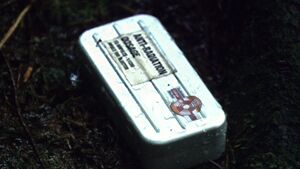Anti-radiation medication
More languages
More actions

Colonial medkits include syringes for injection of anti-radiation medication, colloquially known as anti-rad meds or variants thereof.
This medication is likely designed to allow certain tissues of the human body (typically, the thyroid gland) to block or resist absorption of radiation that proceeds nuclear bomb detonations.
Anti-radiation medications cause nausea[1] in many cases (TRS: "33" and "The Passage").
Usage Following the Fall
editKarl "Helo" Agathon periodically injects himself in his thyroid gland to ward off the effects of Caprica's nuclear bombardment as he sought his way off planet and back to Galactica (TRS: "33").

Agathon, "rescued" by a copy of Sharon Valerii, is led to a fallout shelter that includes anti-radiation supplies (TRS: "You Can't Go Home Again").
Kara "Starbuck" Thrace injects the medication into her arm when she arrives on Caprica to retrieve the Arrow of Apollo (TRS: "Kobol's Last Gleaming, Part II").
Samuel Anders and his team, the Caprica Buccaneers, escape the initial destruction and organized with other Caprica survivors as the Caprica Resistance. They raid old Colonial Fleet supply depots for anti-radiation medication and other supplies, which a Number Four known as "Doc," in the role of the Buccaneer team's medical doctor prior to the Fall, aims to sabotage (TRS: "The Plan" and "Resistance").
The Raptor pilots of the Fleet are routinely injected with anti-radiation medication as part of their series of escort flights through a highly-irradiated star cluster (TRS: "The Passage").
Notes
edit- Potassium iodide blocks absorption of radiation by the thyroid gland and thus reduces the overall bodily absorption of radioactivity.
- Prussian blue is a chemical purgative that, while not preventing radiation damage, reacts with several radioactive compounds to facilitate their removal from the body.
